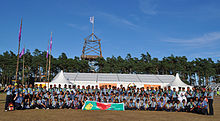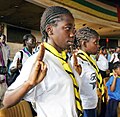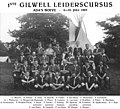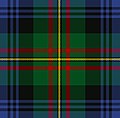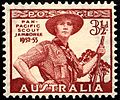Portal:Scouting
The Scouting Portal
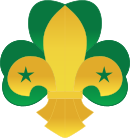
Scouting, also known as the Scout Movement, is a worldwide youth social movement employing the Scout method, a program of informal education with an emphasis on practical outdoor activities, including camping, woodcraft, aquatics, hiking, backpacking, and sports. Another widely recognized movement characteristic is the Scout uniform, by intent hiding all differences of social standing in a country and encouraging equality, with neckerchief and campaign hat or comparable headwear. Distinctive uniform insignia include the fleur-de-lis and the trefoil, as well as merit badges and other patches.
In 1907, Robert Baden-Powell, a lieutenant general in the British Army held a Scouting encampment on Brownsea Island in England. Baden-Powell wrote Scouting for Boys (London, 1908), partly based on his earlier military books. The Scout Movement of both Boy Scouts and Girl Guides (renamed to Girl Scouts in some countries) was well established in the first decade of the twentieth century. Later, programs for younger children, such as Wolf Cubs (1916), now Cubs, and for older adolescents, such as Rovers (1918), were adopted by some Scout organizations. In 1910, Baden-Powell formed the Girl Guides, for girls in the United Kingdom which spread internationally as Girl Guides and includes age programs of (Brownie Guide, Girl Guide and Girl Scout, Ranger Guide).
In 2007, Scouting and Guiding together had over 38 million members in 216 countries. International umbrella organizations include: World Organization of the Scout Movement (WOSM), for boys-only and co-educational organizations: World Association of Girl Guides and Girl Scouts (WAGGGS), primarily for girls-only organizations but also accepting co-educational organizations, World Federation of Independent Scouts, World Organization of Independent Scouts, Order of World Scouts, International Union of Guides and Scouts of Europe, and Confederation of European Scouts. (Full article...)
Selected article -
The World Scout Jamboree is a Scouting jamboree of the World Organization of the Scout Movement, typically attended by several tens of thousands of Scouts from around the world, aged 14 to 17. At the jamboree, many scouts swap badges.
The first World Scout Jamboree was organized by The Scout Association in London. With exceptions for the World War years and the Iranian Revolution, it has been organized approximately every four years, and in the more recent years has been organised by the World Organization of the Scout Movement (WOSM), in different locations over the world. The 25th World Scout Jamboree was held in South Korea in 2023. (Full article...)Selected picture
Did you know
- ... that Olave Baden-Powell was Scoutmaster for the 1st Ewhurst Scout troop and at their first meeting they used the Union Jack that had flown over besieged Mafeking?
- ...that in 1980, the British TV programme Jim'll Fix It, arranged for a group of Cubs to eat their lunch on a rollercoater, with hilarious results. It became one of the most requested clips on British TV. In 2007, the same people, now adults, went back and remade the clip!
- ...that Scouting for Boys was the fourth bestselling book of the 20th century?
- ...that Scouts in Hawaii helped re-introduce the endangered Nene into the Haleakala National Park by carrying young birds into the Haleakala Crater in their backpacks?
- ...that EuroJam 2005 set the world record for the largest single internet order to a supermarket?
Related portals
WikiProjects
Selected biography -

Georges Prosper Remi (French: [ʒɔʁʒ pʁɔspɛʁ ʁəmi]; 22 May 1907 – 3 March 1983), known by the pen name Hergé (/ɛərˈʒeɪ/; French: [ɛʁʒe] ), from the French pronunciation of his reversed initials RG, was a Belgian comic strip artist. He is best known for creating The Adventures of Tintin, the series of comic albums which are considered one of the most popular European comics of the 20th century. He was also responsible for two other well-known series, Quick & Flupke (1930–1940) and The Adventures of Jo, Zette and Jocko (1936–1957). His works were executed in his distinctive ligne claire drawing style.
Born to a lower-middle-class family in Etterbeek, Brussels, Hergé began his career by contributing illustrations to Scouting magazines, developing his first comic series, The Adventures of Totor, for Le Boy-Scout Belge in 1926. Working for the conservative Catholic newspaper Le Vingtième Siècle, he created The Adventures of Tintin in 1929 on the advice of its editor Norbert Wallez. Revolving around the actions of boy reporter Tintin and his dog Snowy, the series' early instalments – Tintin in the Land of the Soviets, Tintin in the Congo, and Tintin in America – were designed as conservative propaganda for children. Domestically successful, after serialisation the stories were published in book form, with Hergé continuing the series and also developing both the Quick & Flupke and Jo, Zette and Jocko series for Le Vingtième Siècle. Influenced by his friend Zhang Chongren, from 1934 Hergé placed far greater emphasis on conducting background research for his stories, resulting in increased realism from The Blue Lotus onward. Following the German occupation of Belgium in 1940, Le Vingtième Siècle was closed, but Hergé continued his series in Le Soir, a popular newspaper controlled by the Nazi administration. (Full article...)Selected anniversaries - June
15th
- 1916 – U.S. President Woodrow Wilson signs a bill incorporating the Boy Scouts of America, making them the only American youth organization with a federal charter.
19th
- 1977 – Death of Olave Baden-Powell
30th
General images
Scouting by region
World Organization of the Scout Movement:
- Africa Scout Region
- Arab Scout Region
- Asia-Pacific Scout Region
- Eurasian Scout Region
- European Scout Region
- Interamerican Scout Region
World Association of Girl Guides and Girl Scouts:
Topics
Scouting lists
- Age groups in Scouting and Guiding
- List of highest awards in Scouting
- List of notable Eagle Scouts
- List of famous Scouts
- List of Order of the Arrow national events
- List of Scouting memorials
- List of Scouting museums
- List of World Association of Girl Guides and Girl Scouts members
- List of World Organization of the Scout Movement members
- Merit badge (Boy Scouts of America)
Subcategories

Recognized content
| This is a list of recognized content, updated weekly by JL-Bot (talk · contribs) (typically on Saturdays). There is no need to edit the list yourself. If an article is missing from the list, make sure it is tagged (e.g. {{WikiProject Scouting}}) or categorized correctly and wait for the next update. See WP:RECOG for configuration options. |
Featured articles
Former featured articles
 Baden-Powell House
Baden-Powell House Robert Baden-Powell, 1st Baron Baden-Powell
Robert Baden-Powell, 1st Baron Baden-Powell Boy Scouts of America membership controversies
Boy Scouts of America membership controversies Brownsea Island Scout camp
Brownsea Island Scout camp Frederick Russell Burnham
Frederick Russell Burnham Eagle Scout
Eagle Scout Gerald Ford
Gerald Ford Gilwell Park
Gilwell Park Girl Scouts of the USA
Girl Scouts of the USA History of merit badges (Boy Scouts of America)
History of merit badges (Boy Scouts of America) L. Ron Hubbard
L. Ron Hubbard Mackinac Island
Mackinac Island Witold Pilecki
Witold Pilecki Franklin D. Roosevelt
Franklin D. Roosevelt Terry Sanford
Terry Sanford Scout Association of Hong Kong
Scout Association of Hong Kong Scouting
Scouting
Main page featured articles
- Buzz Aldrin (2020-01-20)
- Neil Armstrong (2019-07-21)
- Baden-Powell House (2020-02-08)
- Robert Baden-Powell, 1st Baron Baden-Powell (2007-08-01)
- Boy Scouts of America membership controversies (2009-09-26)
- William D. Boyce (2009-06-16)
- Brownsea Island Scout camp (2020-08-01)
- Frederick Russell Burnham (2012-02-09)
- Roger B. Chaffee (2020-02-15)
- Charles Duke (2021-10-03)
- Eagle Scout (2006-11-14)
- Elizabeth II (2012-06-02)
- Gerald Ford (2006-05-06)
- Gilwell Park (2007-05-04)
- Girl Scouts of the USA (2007-10-29)
- E. Urner Goodman (2008-03-28)
- William Hanna (2010-07-14)
- William Hillcourt (2010-08-06)
- History of merit badges (Boy Scouts of America) (2006-02-22)
- Lou Henry Hoover (2024-03-29)
- L. Ron Hubbard (2011-03-13)
- Jim Lovell (2023-03-25)
- Mackinac Island (2010-05-20)
- Witold Pilecki (2005-01-24)
- Franklin D. Roosevelt (2006-10-13)
- Terry Sanford (2010-08-08)
- David Scott (2022-06-06)
- Scout Association of Hong Kong (2010-12-13)
- Scouting (2007-02-06)
- Wood Badge (2007-09-18)
Good articles
 The Adventures of Totor
The Adventures of Totor Henry Allingham
Henry Allingham William Anders
William Anders David Archuleta
David Archuleta Béla H. Bánáthy
Béla H. Bánáthy Bill Bradley
Bill Bradley Stephen Breyer
Stephen Breyer Frederick Russell Burnham
Frederick Russell Burnham Gene Cernan
Gene Cernan George Thomas Coker
George Thomas Coker Gordon Cooper
Gordon Cooper Early life of David Lynch
Early life of David Lynch Arthur Rose Eldred
Arthur Rose Eldred Hergé
Hergé James Jabara
James Jabara The Jungle Book
The Jungle Book William H. Keeler
William H. Keeler Merian C. Cooper
Merian C. Cooper Thomas S. Monson
Thomas S. Monson North-West Mounted Police
North-West Mounted Police Order of the Arrow
Order of the Arrow Ross Perot
Ross Perot Witold Pilecki
Witold Pilecki Frederick Reines
Frederick Reines Franklin D. Roosevelt
Franklin D. Roosevelt Terry Sanford
Terry Sanford Wally Schirra
Wally Schirra Raymond P. Shafer
Raymond P. Shafer Wood Badge (Boy Scouts of America)
Wood Badge (Boy Scouts of America)
Former good articles
Featured lists
Main page featured lists
- List of Eagle Scouts (2012-08-20)
- List of Boy Scout calendar illustrations (2021-02-08)
Featured pictures
-
Buzz Aldrin
-
Guion Bluford
-
Gumdrop Meets Spider - GPN-2000-001100
-
Maresuke Nogi, 近世名士写真 其1 - Photo only
-
Roger B. Chaffee at a console in the Mission Control Center, Houston, during the Gemini-Titan 3 flight
Picture of the day pictures
-
Buzz Aldrin (2022-07-21)
-
Guion Bluford (2019-11-22)
-
Gumdrop Meets Spider - GPN-2000-001100 (2025-03-03)
-
Maresuke Nogi, 近世名士写真 其1 - Photo only (2020-09-13)
-
Roger B. Chaffee at a console in the Mission Control Center, Houston, during the Gemini-Titan 3 flight (2021-03-23)
Did you know? articles
 1st World Scout Jamboree (2006-09-16)
1st World Scout Jamboree (2006-09-16) 3rd World Scout Jamboree (2006-09-22)
3rd World Scout Jamboree (2006-09-22) 50-Miler Award (2006-03-23)
50-Miler Award (2006-03-23) Irena Adamowicz (2008-08-27)
Irena Adamowicz (2008-08-27) Buzz Aldrin (2018-12-23)
Buzz Aldrin (2018-12-23) William Anders (2022-10-01)
William Anders (2022-10-01) Béla H. Bánáthy (2008-09-24)
Béla H. Bánáthy (2008-09-24) Harry Brinkley Bass (2006-09-30)
Harry Brinkley Bass (2006-09-30) Daniel Carter Beard Boyhood Home (2008-05-08)
Daniel Carter Beard Boyhood Home (2008-05-08) Ion Biberi (2023-10-29)
Ion Biberi (2023-10-29) Black Cap Mountain (2020-06-02)
Black Cap Mountain (2020-06-02) Boy Rangers of America (2008-01-04)
Boy Rangers of America (2008-01-04) Brownsea Island Scout camp (2006-07-12)
Brownsea Island Scout camp (2006-07-12) Russell Adam Burnham (2007-10-16)
Russell Adam Burnham (2007-10-16) Camp Paxson Boy Scout Camp (2012-06-03)
Camp Paxson Boy Scout Camp (2012-06-03) Camp Pico Blanco (2009-11-20)
Camp Pico Blanco (2009-11-20) Campfire ash ceremony (2020-08-11)
Campfire ash ceremony (2020-08-11) Roger B. Chaffee (2019-07-17)
Roger B. Chaffee (2019-07-17) Anne Hyde Choate (2007-04-26)
Anne Hyde Choate (2007-04-26) George Thomas Coker (2006-01-10)
George Thomas Coker (2006-01-10) Gordon Cooper (2019-03-09)
Gordon Cooper (2019-03-09) Cornwell Scout Badge (2014-02-16)
Cornwell Scout Badge (2014-02-16) Charles Duke (2020-01-09)
Charles Duke (2020-01-09) Duty to God Award (2008-08-22)
Duty to God Award (2008-08-22) Early life of David Lynch (2012-09-25)
Early life of David Lynch (2012-09-25) Arthur Rose Eldred (2006-01-19)
Arthur Rose Eldred (2006-01-19) Elizabeth II (2006-04-02)
Elizabeth II (2006-04-02) Fadjar Harapan (2011-01-05)
Fadjar Harapan (2011-01-05) Ferenc Farkas de Kisbarnak (2008-12-27)
Ferenc Farkas de Kisbarnak (2008-12-27) Tom Foley (2004-06-24)
Tom Foley (2004-06-24) Gilwell Oak (2018-03-04)
Gilwell Oak (2018-03-04) Ging Gang Goolie (2006-11-24)
Ging Gang Goolie (2006-11-24) Girl Scout National Center West (2010-10-12)
Girl Scout National Center West (2010-10-12) Grey Ranks (2005-01-27)
Grey Ranks (2005-01-27) Growth of a Leader (2015-01-28)
Growth of a Leader (2015-01-28) Józef Haller (2008-01-26)
Józef Haller (2008-01-26) William G. Higgs (2010-08-29)
William G. Higgs (2010-08-29) Historic Trails Award (2010-07-10)
Historic Trails Award (2010-07-10) Josephine Groves Holloway (2019-08-04)
Josephine Groves Holloway (2019-08-04) Lou Henry Hoover (2023-01-23)
Lou Henry Hoover (2023-01-23) James G. Howes (2010-06-22)
James G. Howes (2010-06-22) Humshaugh (2007-02-02)
Humshaugh (2007-02-02) Nicolae Iorga (2011-05-23)
Nicolae Iorga (2011-05-23) Ivančena (2024-05-14)
Ivančena (2024-05-14) John Work House and Mill Site (2006-09-05)
John Work House and Mill Site (2006-09-05) Eva Julius (2022-06-25)
Eva Julius (2022-06-25) Valdemārs Klētnieks (2020-09-16)
Valdemārs Klētnieks (2020-09-16) Koshare Indian Museum and Dancers (2009-12-08)
Koshare Indian Museum and Dancers (2009-12-08) Len Lanzi (2020-09-20)
Len Lanzi (2020-09-20) Wilbert E. Longfellow (2022-07-05)
Wilbert E. Longfellow (2022-07-05) Jim Lovell (2021-10-20)
Jim Lovell (2021-10-20) Mafeking Cadet Corps (2006-05-12)
Mafeking Cadet Corps (2006-05-12) Sanford N. McDonnell (2006-03-21)
Sanford N. McDonnell (2006-03-21) Merian C. Cooper (2016-12-08)
Merian C. Cooper (2016-12-08) Ellie Morrison (2019-11-29)
Ellie Morrison (2019-11-29) Mounted Boy Scout Troop 290 (2012-04-24)
Mounted Boy Scout Troop 290 (2012-04-24) 2010 National Scout Jamboree (2010-08-20)
2010 National Scout Jamboree (2010-08-20) Nkwenkwe Nkomo (2008-10-14)
Nkwenkwe Nkomo (2008-10-14) Outlaw Trail: The Treasure of Butch Cassidy (2009-05-29)
Outlaw Trail: The Treasure of Butch Cassidy (2009-05-29) Owasippe Scout Reservation (2006-02-02)
Owasippe Scout Reservation (2006-02-02) Oleg Pantyukhov (2006-12-13)
Oleg Pantyukhov (2006-12-13) Margrethe Parm (2022-07-30)
Margrethe Parm (2022-07-30) Sir Arthur Pearson, 1st Baronet (2005-12-12)
Sir Arthur Pearson, 1st Baronet (2005-12-12) Ross Perot (2020-05-13)
Ross Perot (2020-05-13) Robert W. Peterson (writer) (2008-06-11)
Robert W. Peterson (writer) (2008-06-11) Witold Pilecki (2022-03-04)
Witold Pilecki (2022-03-04) Polish Scouting and Guiding Association (2004-08-06)
Polish Scouting and Guiding Association (2004-08-06) Catherine Pollard (Scouting) (2010-07-12)
Catherine Pollard (Scouting) (2010-07-12) Quartermaster Award (Boy Scouts of America) (2009-06-27)
Quartermaster Award (Boy Scouts of America) (2009-06-27) Oluf Reed-Olsen (2010-04-04)
Oluf Reed-Olsen (2010-04-04) Frederick Reines (2015-03-19)
Frederick Reines (2015-03-19) Religion in Scouting (2006-12-04)
Religion in Scouting (2006-12-04) Resica Falls Scout Reservation (2006-08-17)
Resica Falls Scout Reservation (2006-08-17) Edward L. Rowan (2010-07-19)
Edward L. Rowan (2010-07-19) Carl Rungius (2008-08-18)
Carl Rungius (2008-08-18) Izabela Sadoveanu-Evan (2011-05-25)
Izabela Sadoveanu-Evan (2011-05-25) Terry Sanford (2022-06-20)
Terry Sanford (2022-06-20) Faisal bin Abdullah Al Saud (born 1950) (2012-05-23)
Faisal bin Abdullah Al Saud (born 1950) (2012-05-23) Wally Schirra (2018-10-03)
Wally Schirra (2018-10-03) David Scott (2019-07-21)
David Scott (2019-07-21) Scout councils (Boy Scouts of America) (2013-03-16)
Scout councils (Boy Scouts of America) (2013-03-16) Scouter's Key Award (2010-09-10)
Scouter's Key Award (2010-09-10) Scouter's Training Award (2010-09-07)
Scouter's Training Award (2010-09-07) Scouting in displaced persons camps (2007-11-07)
Scouting in displaced persons camps (2007-11-07) Scouting/USA (2018-03-06)
Scouting/USA (2018-03-06) Scouting and Guiding in Saskatchewan (2009-03-28)
Scouting and Guiding in Saskatchewan (2009-03-28) The Scoutmaster (2014-06-15)
The Scoutmaster (2014-06-15) Scouts' Day (2006-10-10)
Scouts' Day (2006-10-10) Silver Fish Award (2006-09-30)
Silver Fish Award (2006-09-30) Silver Knapsack Trail (2010-11-02)
Silver Knapsack Trail (2010-11-02) Bolton Smith (2022-05-28)
Bolton Smith (2022-05-28) Squirrel Scouts (The Scout Association) (2021-10-04)
Squirrel Scouts (The Scout Association) (2021-10-04) Statue of Liberty (Seattle) (2018-11-08)
Statue of Liberty (Seattle) (2018-11-08) Strengthen the Arm of Liberty (2008-11-11)
Strengthen the Arm of Liberty (2008-11-11) Sturmtrupp-Pfadfinder (2008-01-10)
Sturmtrupp-Pfadfinder (2008-01-10) Unami Lodge (2007-05-29)
Unami Lodge (2007-05-29) Valley Forge Pilgrimage (2006-10-30)
Valley Forge Pilgrimage (2006-10-30) William Verbeck (2020-01-10)
William Verbeck (2020-01-10) Vermejo Park Ranch (2008-02-19)
Vermejo Park Ranch (2008-02-19) Frank H. Wadsworth (2022-07-07)
Frank H. Wadsworth (2022-07-07) We, Too, Have a Job to Do (2016-01-04)
We, Too, Have a Job to Do (2016-01-04) Ye Htoon (2006-12-15)
Ye Htoon (2006-12-15)
In the News articles
 Henry Allingham (2009-04-01)
Henry Allingham (2009-04-01) Neil Armstrong (2012-08-25)
Neil Armstrong (2012-08-25) Stephen Bechtel Jr. (2021-03-17)
Stephen Bechtel Jr. (2021-03-17) Gene Cernan (2017-01-18)
Gene Cernan (2017-01-18) Elizabeth II (2015-09-09)
Elizabeth II (2015-09-09) Tom Foley (2013-10-18)
Tom Foley (2013-10-18) Juan Carlos I (2014-06-03)
Juan Carlos I (2014-06-03) William H. Keeler (2017-03-26)
William H. Keeler (2017-03-26) Little Sioux Scout Ranch (2008-06-12)
Little Sioux Scout Ranch (2008-06-12) Charles McGee (pilot) (2022-01-17)
Charles McGee (pilot) (2022-01-17) Thomas S. Monson (2018-01-03)
Thomas S. Monson (2018-01-03) Ross Perot (2019-07-11)
Ross Perot (2019-07-11) Debbie Reynolds (2016-12-29)
Debbie Reynolds (2016-12-29)
Associated Wikimedia
The following Wikimedia Foundation sister projects provide more on this subject:
-
Commons
Free media repository -
Wikibooks
Free textbooks and manuals -
Wikidata
Free knowledge base -
Wikinews
Free-content news -
Wikiquote
Collection of quotations -
Wikisource
Free-content library -
Wikiversity
Free learning tools -
Wiktionary
Dictionary and thesaurus

